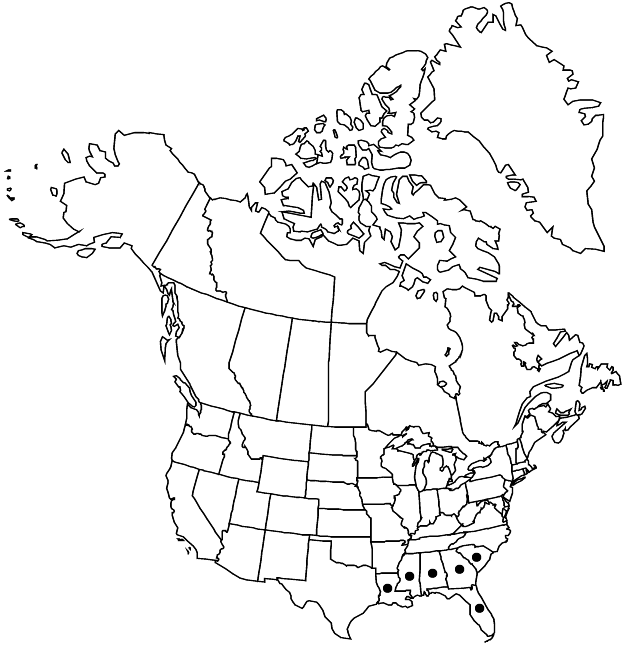Sideroxylon reclinatum
Fl. Bor.-Amer. 1: 122. 1803 ,.
Shrubs or trees, to 5 m. Stems armed, glabrous, glabrate, or strigose. Leaves deciduous or persistent; petiole 1.5–6 mm, usually glabrous, sometimes hairy at base; blade (lustrous dark green adaxially), broadly elliptic, oblanceolate, or spatulate, 9–52 × 3.5–25 mm, base attenuate to cuneate, margins plane, apex rounded to obtuse, sometimes retuse, abaxial surface glabrous or sparsely villous along midrib or villous across blade (hairs tawny), venation visible, adaxial surface glabrous or sparsely villous along midrib, midrib flat, marginal vein absent. Inflorescences 4–20-flowered. Pedicels 2–16 mm, usually glabrous, rarely strigose. Flowers: calyx 1.5–2.4 mm diam.; sepals 5 (–6), 1.4–2.1 × 1–1.3 mm, usually glabrous, rarely strigose; petals 5, white, median segment broadly ovate, 1.1–1.3 mm, lateral segments lanceolate to falcate, 1.1–1.3 mm; stamens 5, 2.3–2.7 mm; staminodes broadly lanceolate, 1.1–1.3 mm, erose; anthers lanceolate to sagittate, 0.9–1.2 mm; pistil (4–) 5-carpellate; ovary (4–) 5-locular, 1–1.3 mm, sparsely to densely strigose; style 0.7–1.2 mm. Berries purplish black, ellipsoid to subglobose, 4–9 mm, glabrous or glabrate. Seeds 3–7 mm.
Distribution

Ala., Fla., Ga., La., Miss., S.C.
Discussion
Subspecies 2 (2 in the flora).
Except for its treatment as a variety of Bumelia lycioides, Sideroxylon reclinatum generally has been recognized at the rank of species. Its distinctive characteristics are shrubby habit, twigs with thorns, conspicuously reticulate leaves, glabrous or sparsely villous (subsp. reclinatum), or villous (subsp. austrofloridense) abaxial leaf surfaces, white to tawny hairs, and comparatively small fruits. Because of polymorphism in twig indument, the extent of indument on abaxial leaf surfaces, hair density of sepals and pistils, and fruit size, two or three infraspecific taxa have been recognized commonly (R. D. Whetstone 1985). Although var. or subsp. rufotomentosum previously has been included in B. reticulata, S. rufohirtum (= B. rufotomentosa) is treated as a species here (see discussion under S. rufohirtum). We recognize two subspecies within S. reclinatum differentiated by the extent of indument on abaxial leaf surfaces.
Selected References
None.
Key
| 1 | Abaxial leaf surfaces glabrous or sparsely villous along midrib; pedicels and sepals glabrous. | Sideroxylon reclinatum subsp. reclinatum |
| 1 | Abaxial leaf surfaces villous across blade; pedicels and sepals strigose. | Sideroxylon reclinatum subsp. austrofloridense |